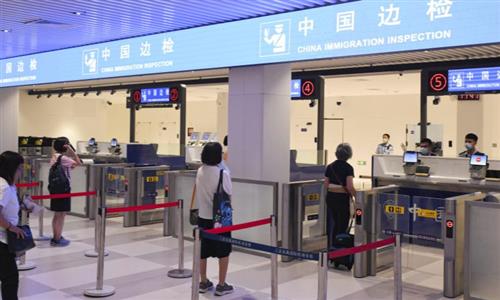WHO warns of rising global trend of COVID-19; Chinese expert advocates for increasing stockpile of antiviral medicine

An exterior view of the headquarters of the World Health Organization (WHO) in Geneva, Switzerland.Photo: Xinhua
The World Health Organization (WHO) has warned of the rising trends of COVID-19 as winter approaches in the Northern Hemisphere, calling for increased vaccinations and surveillance, while a Chinese expert advocated for more frequent releases of COVID-19 data and an increase in the stockpile of antiviral medicine at grassroots hospitals to cope with a possible resurgence of the pandemic.
Deaths are increasing in some parts of the Middle East and Asia, while intensive care unit admissions are increasing in Europe and hospitalizations are increasing in several regions, WHO Director-General Tedros Adhanom Ghebreyesus told an online news conference in Geneva on Wednesday.
According to Tedros, only 43 countries - less than a quarter of the 194 WHO member states - are reporting COVID-19 deaths to the agency, and only 20 provide information about hospitalizations. Whereas the WHO estimates that there are hundreds of thousands of people in hospitals now for COVID-19, Maria van Kerkhove, the WHO's technical lead on COVID-19, said.
Zhuang Shilihe, a medical expert based in Guangzhou, South China's Guangdong, suggested that China should also strengthen its monitoring on COVID-19, especially for the prevalence of relevant variants in the mainland.
According to Zhuang, the statistics of COVID-19 cases should be released to the public more frequently, from the current once a month to a shortened interval duration.
During the colder months, which are just around the corner in the northern hemisphere, people are exposed to a higher risk of infection because they spend more time indoors together, and viruses that transmit through the air like COVID-19 will take advantage of that, the WHO's top coronavirus expert Van Kerkhove said.
One of the WHO's biggest concerns was how few at-risk people had recently received a COVID-19 vaccine, Tedros said, calling for the vulnerable not to wait to get a booster dose.
To further prepare for the response to the COVID-19 resurgence in the coming autumn and winter, and to maximize the protection of people's lives and health, the Joint Prevention and Control Mechanism of China's State Council recently issued a notice on the COVID-19 vaccination plan for key population groups.
Tedros said that while there is not currently a single dominant COVID-19 coronavirus variant worldwide, the EG.5 Omicron subvariant is on the rise.
Meanwhile, only 42 cases of the new BA.2.86 variant, also known as Pirola, which the WHO has been monitoring since mid-August, have been recorded worldwide in 11 countries, Van Kerkhove said.
Preliminary data suggests that existing vaccines will give protection against BA.2.86, Van Kerkhove said, noting that the COVID-19 vaccines currently available also protect against severe illness and death when contracting newer virus variants.
The US CDC has previously indicated that BA.2.86 may be more capable of causing infection in people who previously had COVID-19 or were vaccinated with previous shots.
According to the notice from the Joint Prevention and Control Mechanism, the XBB variants of COVID-19 have become the current predominant strain in local outbreaks in China. Researches have indicated that the XBB variants exhibit a strong ability to evade immunity, posing a greater threat to key populations such as the elderly. The serum antibodies of the Chinese population have a relatively weak neutralizing ability against the XBB variants, making it more susceptible for Chinese people to have breakthrough infections.
Thus, the vaccination work plan explicitly states that during the prevalence of the XBB variants, particularly this upcoming autumn and winter, it is recommended to prioritize vaccination with vaccines containing antigenic components targeting the XBB variants.
Moderna and Pfizer said on Wednesday that their updated COVID-19 vaccines aimed at the XBB.1.5 subvariant, the dominant variant through most of 2023, generated strong responses in testing against the highly mutated BA.2.86 subvariant of COVID-19 that has raised fears of a resurgence of infections.
Moderna said its shot generated an 8.7-fold increase in neutralizing antibodies against BA.2.86 compared with an untreated natural antibody response in clinical trials in humans.
Zhuang suggested that China should also promote the update of vaccines and the research and development of new vaccines and booster vaccinations, especially among high-risk population groups. Meanwhile, he suggested that vaccine companies disclose more comprehensive data of their vaccines to the public.
Multiple places across China, including East China's Zhejiang Province, Northwest China's Xinjiang Uygur Autonomous Region and North China's Inner Mongolia Autonomous Region, have rolled out programs advocating for vaccination against XBB variants, especially for vulnerable groups such as the elderly.
Apart from vaccinations, Zhuang also advised that people wear masks at high-risk venues and increase the stockpile of antiviral medicine at grassroots hospitals to cope with the possible resurgence of COVID-19 in the coming autumn and winter seasons.



